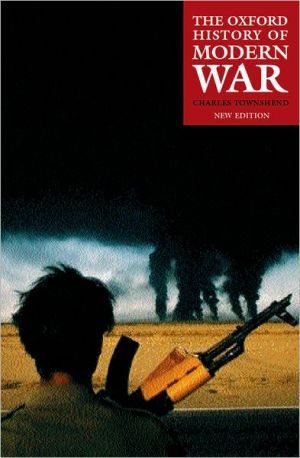

 |

|

The average rating for Oxford History of Modern War (New Edition) based on 2 reviews is 3.5 stars.
Review # 1 was written on 2018-03-08 00:00:00 Ben Fitzgerald Ben FitzgeraldI used to think peace was the "norm" and war was kind of an upheaval or exception to the status quo. And while my knowledge of history is still pretty pathetic, I think I've come to the opposite conclusion. Violence seems to be an integral part of what it means to be human (at least, in a collective sense). The threat of force is the glue that holds societies together."... it was a respected British periodical, the Nineteenth Century,... which asserted that 'the only court in which nations' issues can and will be tried is the court of God, which is war." This book looks at warfare from about 1700 up through the end of the 20th century. Each chapter is more like a stand-alone article written by a different author and yet the book has an amazing amount of cohesiveness. Things start off with a look at the impact of cavalry and fortress-based warfare, moving on to how different formations, and weapons start to change the nature of war. A fierce practicality underlies most of the book as age-old factors must continually be dealt with: how to maintain and train an army without bankrupting a society or giving the military too much power, when and how to engage in conflict, how to maintain morale and supply troops effectively (hunger trumps passion/dedication every time), ethical considerations and regulations of what is allowed within the field of battle (i.e., acceptable targets, weapons, treatment of prisoners, etc.), and the effectiveness of battle in terms of conflict resolution/achieving stated goals. States in dispute with one another essentially have 4 options: 1) diplomacy/negotiations (i.e., discussing and reaching a mutually agreed-upon solution); 2) trade/economic sanctions; 3) revolution (i.e., internal social/political forces upending your enemy); or 4) war. War has always been costly (both in terms of resources and actual lives) and its effectiveness always in question. One chapter pointed to WWII as a major argument against a growing trend toward pacifism (since appeasement seemed like a royal farce in light of the type of "evil" and destruction wrought by Nazi Germany; something only force could stop). Some of the changes in scale and/or pace of change mentioned in a handful of sentences were hard to wrap my head around: "... the aircraft with which the main military powers opened the war of 1914-1918 were entirely useless by the time that it ended." "The cost of [WWI] in human terms was 8.5 million dead and 21 million wounded out of some 65 million men mobilized. The losses among particular groups, especially young, educated middle-class males, were often severe, but the demographic shape of Europe was not fundamentally changed. The real impact was moral. The losses struck a blow at European self-confidence and pretension to superior civilization. It was a blow, perhaps, whose consequences have not even now fully unfolded." "Throughout American involvement in [Vietnam] over 8 million tons of bombs were dropped on North Vietnam and the Viet-cong guerrilla forces, twice as much as the quantity dropped by all combatants in the Second World War." The writers go on to dispel the myth of superior air power and/or nuclear weapons as sure means to victory, as the nature of war seems currently geared toward more "low-level conflicts" in terrains not well-suited for traditional combat forces. Precision offensive systems are offset by advances in defense and/or the blurring of lines between enemy and civilian. Just maintaining and/or replacing equipment and munitions becomes a kind of debt-spiraling enterprise. We are left with a present that is both more hopeful than ever before (given how interconnected the world now is in terms of trade and communication), but also more frightening (given the power and danger of our destructive capabilities). ------------------------------------------ WORDS I LEARNED WHILE READING THIS BOOK epigram | poltroon | halberd | enfilade | janizary | sepoy | suzerainty | tirailleurs | caracole |
Review # 2 was written on 2019-02-23 00:00:00 Marsha Mann Marsha MannAn interesting read and indeed the content is important, a bit dry in parts and/or an assumption that each reader has an awareness of military strategy but if you read through those bits it's good |
CAN'T FIND WHAT YOU'RE LOOKING FOR? CLICK HERE!!!